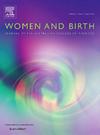巴布亚新几内亚西部高地省农村地区影响妇女和男子出生地决定的因素:一项定性描述性研究。
IF 4.4
2区 医学
Q1 NURSING
引用次数: 0
摘要
背景:有证据表明,由熟练的助产人员接生可改善孕产妇和新生儿的健康状况。然而,虽然巴布亚新几内亚西部高地省的大多数妇女在怀孕期间在保健机构寻求熟练的保健服务,但一半以上的妇女在家中或没有熟练接生人员的村庄分娩。目的:探讨巴布亚新几内亚西部高地省农村妇女和男子选择出生地的影响因素。方法:采用定性描述性研究。对20名参与者进行了半结构化的深度访谈(16名怀孕或最近分娩的女性和4名伴侣怀孕或最近分娩的男性)。采访录音并逐字抄写。对数据进行了专题分析。结果:从研究结果中确定了与分娩地点决定因素相关的三个关键主题:(1)卫生服务的可及性和可获得性;(2)社会文化影响;(3)以前的产科护理经验。参与者的经历影响了他们对出生地的选择,导致许多人在没有熟练接生人员的情况下在村里的家中分娩。结论:需要适当调整妇幼保健服务,以改善可及性,满足巴布亚新几内亚孕妇未满足的需求。此外,健康教育计划应解决影响医疗保健服务吸收的社会文化因素,特别是在健康差距更为明显的农村地区。在本研究背景下,需要进一步的研究来探索卫生工作者的观点、父权制控制和对卫生服务利用的尊重。本文章由计算机程序翻译,如有差异,请以英文原文为准。
Factors influencing women's and men's place of birth decisions in rural Western Highlands Province of Papua New Guinea: A qualitative descriptive study
Background
Evidence shows that birthing with a skilled birth provider improves maternal and neonatal health outcomes. However, whilst most women in the Western Highlands Province of Papua New Guinea seek skilled health care during pregnancy in a health facility, more than half give birth at home or in the village without a skilled birth provider.
Aim
To explore the factors influencing women's and men's decisions about place of birth in rural Western Highlands Province of Papua New Guinea.
Method
A qualitative-descriptive study was conducted. Semi-structured, in-depth interviews were conducted with 20 participants (16 women who were pregnant or recently given birth and four men whose partners were pregnant or recently gave birth). Interviews were audio-recorded and transcribed verbatim. The data was thematically analysed.
Results
Three key themes associated with the place of birth decision factors were identified from the study findings: (1) health service accessibility and availability, (2) socio-cultural influences, and (3) previous maternity care experiences. Participant experiences influenced their choice of place of birth, resulting in many giving birth at home in their village without a skilled birth provider.
Conclusion
Maternal and child health services need to be appropriately tailored to improve accessibility and meet the unmet needs of pregnant women in Papua New Guinea. Additionally, health education programs should address socio-cultural factors influencing the uptake of healthcare services, especially in rural areas where health disparities are more evident. Further research is required to explore health worker perspectives, patriarchal control, and respectful care regarding health service utilisation in this study context.
求助全文
通过发布文献求助,成功后即可免费获取论文全文。
去求助
来源期刊

Women and Birth
NURSING-OBSTETRICS & GYNECOLOGY
CiteScore
7.20
自引率
13.20%
发文量
371
审稿时长
27 days
期刊介绍:
Women and Birth is the official journal of the Australian College of Midwives (ACM). It is a midwifery journal that publishes on all matters that affect women and birth, from pre-conceptual counselling, through pregnancy, birth, and the first six weeks postnatal. All papers accepted will draw from and contribute to the relevant contemporary research, policy and/or theoretical literature. We seek research papers, quality assurances papers (with ethical approval) discussion papers, clinical practice papers, case studies and original literature reviews.
Our women-centred focus is inclusive of the family, fetus and newborn, both well and sick, and covers both healthy and complex pregnancies and births. The journal seeks papers that take a woman-centred focus on maternity services, epidemiology, primary health care, reproductive psycho/physiology, midwifery practice, theory, research, education, management and leadership. We also seek relevant papers on maternal mental health and neonatal well-being, natural and complementary therapies, local, national and international policy, management, politics, economics and societal and cultural issues as they affect childbearing women and their families. Topics may include, where appropriate, neonatal care, child and family health, women’s health, related to pregnancy, birth and the postpartum, including lactation. Interprofessional papers relevant to midwifery are welcome. Articles are double blind peer-reviewed, primarily by experts in the field of the submitted work.
 求助内容:
求助内容: 应助结果提醒方式:
应助结果提醒方式:


